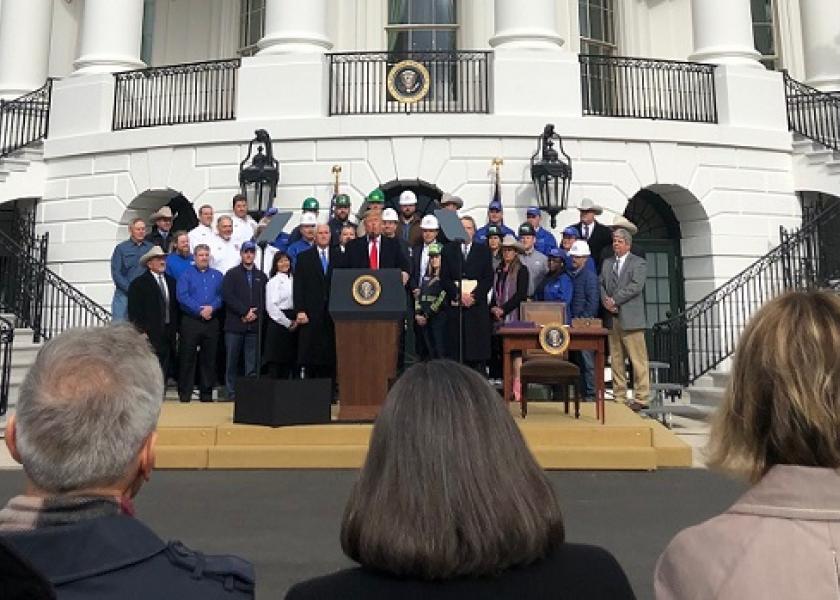USMCA signed by Trump

Securing long-term trade certainty with Canada and Mexico, President Donald Trump has signed the United States-Mexico-Canada Agreement.
Trump, a harsh critic of the North American Free Trade Agreement while campaigning for president in 2016, celebrated the signing of NAFTA 2.0 with an event at the White House on Jan. 29.
“Today we’re finally ending the NAFTA nightmare and signing into law the brand new United States-Mexico-Canada Agreement,” Trump said at the event. “USMCA is the largest fairest, most balanced and modern trade agreement ever,” he said. “This is a colossal victory for our farmers, ranchers, energy workers, factory workers and American workers in all 50 states.”
Industry officials expressed strong support for USMCA, although some Florida and Southeast U.S. grower groups were opposed to the deal.
“One of the immediate benefits to the produce and floral industries will be greater predictability of trade,” Richard Owen, vice president of global membership and engagement for the Produce Marketing Association, said in a statement. “With predictability comes confidence which in turn encourages investment in infrastructure and production to support the North American market. The agreement maintains zero tariffs for the trading of fruits and vegetables, modernizes labor provisions and intellectual property rights, and is consistent with PMA’s overarching goals for free and fair trade.”
Passing the agreement with the two biggest trading partners of the U.S. was critical, Tom Stenzel, president and CEO of United Fresh Produce Association, said in an opinion piece published by The Packer.
“For agriculture, generally, and our fresh produce industry specifically, the agreement does not make everyone universally happy,” Stenzel said, “But USMCA demonstrates a commitment to consumers in all three countries to allow our free enterprise system to work its magic, providing access to goods and services that consumers want.”
The agreement is expected to stabilize the U.S. potato export markets of Canada and Mexico by both eliminating the threat of retaliatory tariffs and precluding the loss of tariff benefits previously provided by NAFTA, the National Potato Council said in a news release.
“The National Potato Council welcomes today’s signing of the USMCA trade agreement – one of the most significant trade pacts in decades – and thanks President Trump for his support of the U.S.-Japan Agreement on Agricultural Trade and the U.S.-China Phase One Agreement earlier this year,” Britt Raybould, president of the National Potato Council, said in the release.
Trump administration officials praised the deal as a win for U.S farmers.
“Today is a good day for American agriculture,” Agriculture Secretary Sonny Perdue said in a statement. “I am excited to see the economic benefits of this agreement increase the prosperity of all Americans, especially those living in rural America,”
Under USMCA, all food and agricultural products that have zero tariffs under NAFTA will remain at zero tariffs, and the new trade deal will create new market access opportunities for U.S. exports to Canada of dairy, poultry, and eggs, according to the USDA. In exchange, the U.S. will provide new access to Canada for some dairy, peanut, and a limited amount of sugar and sugar-containing products.
While Trump’s action is the final step needed for the agreement to become law in the U.S., Owen said that Canada’s Parliament has yet to approve it. That could happen fairly soon, he said.
After all three countries have signed, Owen said the agreement will not go into effect (or replace NAFTA) on the first day of the third month after the final signature is received.
For example, if Canada ratifies the agreement in February, USMCA would become official as of June 1, Owen said.
“PMA has been resolute in our support of the passage of USMCA and welcomes the update to NAFTA which has significantly aided the effort to increase year-round availability of fresh fruits and vegetables, ultimately increasing consumption,” Owen said in the statement.
Related articles
USMCA brings clear roadmap for the future







